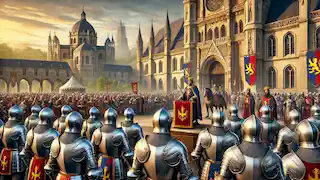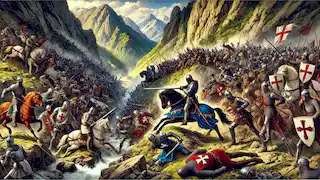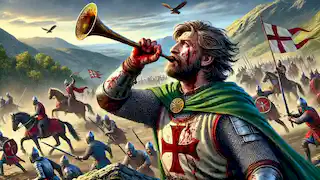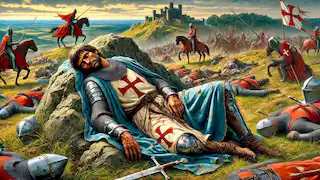The Call to Arms
In the heart of medieval France, the kingdom lay under the threat of invasion. The once peaceful lands of King Charlemagne were now facing turmoil from the relentless Saracens. The air was thick with the tension of impending conflict, and the echoes of clashing swords could almost be heard in the distance.
Roland, the most trusted and valiant knight of Charlemagne, stood upon a hill overlooking the grand city of Paris. His chiseled features were set in determination, his eyes burning with a fierce resolve to protect his homeland. Clad in shimmering armor, he was a beacon of hope for the people. His loyal steed, Bayard, pawed the ground impatiently, sensing the urgency of the hour.
"Roland," came a voice from behind. It was Oliver, Roland's closest companion and a knight of equal renown. "The Saracens have breached the southern borders. We must prepare for battle."
Roland turned, his expression softening slightly at the sight of his friend. "We will not let them take our land, Oliver. Gather the men. We ride at dawn."
That night, Roland could not sleep. He wandered the halls of Charlemagne's palace, the weight of his responsibilities pressing heavily on his shoulders. The moonlight cast a pale glow on the ancient stone walls, illuminating the rich tapestries that depicted the history of France. He paused before one, showing a scene of his own heroic deeds. It seemed a lifetime ago when he had first pledged his loyalty to Charlemagne, swearing to protect the kingdom at all costs.
As he stood lost in thought, a soft voice broke the silence. "You carry a great burden, Roland."
He turned to see Aude, his beloved, standing in the doorway. Her beauty was ethereal, her eyes filled with concern. She approached him, her touch gentle as she placed a hand on his arm.
"I fear for you," she whispered. "The battles you fight... they seem endless."
Roland took her hand in his, his heart heavy. "I fight for you, for our future. I cannot rest until our land is safe."
Aude's eyes glistened with unshed tears. "Promise me you'll return."
"I promise," Roland said, his voice firm. "No matter what, I will find my way back to you."
The Assembly of Heroes
As the first light of dawn broke over the horizon, the knights of Charlemagne assembled in the grand courtyard of the palace. Their armor gleamed under the early morning sun, and the sound of metal clinking filled the air. Among them were some of the greatest heroes of France: Oliver, Archbishop Turpin, and the mighty warrior Ogier the Dane.

King Charlemagne himself addressed the gathering, his voice carrying the weight of his years and the wisdom of his reign. "Brave knights of France, our land is under siege. The Saracens threaten our homes, our families, and our way of life. But we are not a people who yield to fear. We are the warriors of France, and we shall defend our kingdom with honor and courage."
A cheer rose from the assembled knights, their spirits bolstered by the king's words. Roland, at the forefront, raised his sword high. "For France! For Charlemagne!"
The knights set out that very day, their resolve unshaken. The journey to the southern borders was arduous, the landscape changing from lush green fields to rugged mountains as they approached the Roncevaux Pass, a narrow and treacherous route through the Pyrenees. It was here that they knew the Saracens would make their stand.
Along the way, they encountered villagers fleeing their homes, their faces etched with fear and despair. Roland and his knights offered what aid they could, providing food and comfort. One elderly man grasped Roland's hand, his eyes filled with gratitude.
"Bless you, sir knight," he said. "You are our hope."
Roland nodded solemnly. "We will drive the invaders from our land. I swear it."
The Battle of Roncevaux Pass
The journey to the southern borders was arduous, but the knights pressed on, driven by their unwavering resolve. The landscape changed from lush green fields to rugged mountains as they approached the Roncevaux Pass, a narrow and treacherous route through the Pyrenees. It was here that they knew the Saracens would make their stand.

The battle began with a thunderous clash of steel. Roland led the charge, his sword Durendal cutting through the enemy ranks with unmatched precision. Beside him, Oliver fought valiantly, his axe cleaving through armor and flesh alike. The knights of France were a formidable force, their skill and bravery unmatched.
But the Saracens were relentless, and their numbers seemed endless. As the sun began to set, the tide of battle turned against the French. Roland, bloodied but unbowed, fought on with a ferocity born of desperation.
"Hold the line!" he shouted, rallying his men. "We must not let them pass!"
Despite their best efforts, the French forces were being overwhelmed. The narrow pass became a chaotic battleground, with men fighting and falling in the confined space. Roland's thoughts turned to Aude, and he fought with renewed vigor, determined to fulfill his promise to her.
In the heat of battle, Roland caught sight of a Saracen warrior who seemed to be directing the enemy forces. With a burst of speed, he charged, engaging the commander in fierce combat. Their swords clashed, sparks flying with each strike. Roland's strength and skill proved superior, and with a final, powerful blow, he defeated the commander.
The fall of their leader caused confusion among the Saracens, and the French knights seized the opportunity to press their advantage. But the respite was brief, as fresh waves of enemy reinforcements poured into the pass.
The Horn of Roland
As the battle raged on, it became clear that the French were outnumbered and outmatched. Roland, realizing the dire situation, made a fateful decision. He reached for his oliphant, a great horn made from the ivory of an elephant, and blew a mighty blast. The sound echoed through the mountains, a call for aid that reached the ears of King Charlemagne himself.

The blast of the horn was a sound of desperation, but also of defiance. It resonated through the valleys and reached Charlemagne, who was miles away. The king recognized the call immediately and knew that his knights were in grave danger.
Roland's efforts came at a great cost. The strain of blowing the horn tore his muscles and burst his blood vessels, leaving him mortally wounded. Despite his injuries, he continued to fight, determined to protect his comrades and his homeland until his last breath.
Meanwhile, Charlemagne wasted no time. He gathered his remaining forces and marched towards the sound of the horn, pushing his men to their limits. The journey was grueling, but the thought of his knights, especially Roland, gave him the strength to carry on.
The Fall of Roland
As the Saracens closed in, Roland knew that his time was short. He climbed to a nearby hilltop, seeking a vantage point from which he could continue the fight. But his strength was failing, and he knew he could not hold out much longer.
With his final breaths, Roland prayed for his soul and the souls of his fallen comrades. He laid Durendal beneath him, determined to prevent it from falling into enemy hands. As he gazed out over the battlefield, he felt a sense of peace wash over him. He had given everything for his kingdom and his king.

When King Charlemagne and his army finally arrived, they found Roland's lifeless body surrounded by the slain enemies he had vanquished. The sight of their fallen hero filled the French with a renewed fury, and they launched a devastating counterattack that drove the Saracens from their land.
The battlefield was littered with the bodies of the fallen, both friend and foe. Charlemagne knelt beside Roland, his heart heavy with sorrow. He gently closed the knight's eyes and whispered a prayer.
"You have served France well, my friend. Rest now, your duty is done."
The Legacy of Roland
The battle of Roncevaux Pass became legend, a tale of heroism and sacrifice that would be told for generations. Roland's courage and loyalty were celebrated in songs and stories, and his name became synonymous with the spirit of France.
King Charlemagne honored his fallen knight with a grand funeral, and a monument was erected at the site of his final stand. The oliphant, cracked and broken from Roland's mighty blast, was placed in the king's treasury as a symbol of the knight's unyielding strength and bravery.
The story of Roland inspired many. Young knights aspired to be like him, taking up arms to defend their homeland with the same fervor and dedication. Aude, heartbroken but proud, carried on his legacy, helping those in need and telling the tale of her beloved Roland to all who would listen.
In the years that followed, the kingdom of France flourished, united by the spirit of its heroes. The memory of Roland and his companions served as a beacon of hope and courage, reminding the people of the strength that lies in unity and the power of sacrifice.
The Songs of Roland
The minstrels of France took up their lutes and harps, crafting songs that would immortalize the deeds of Roland and his fellow knights. The "Chanson de Roland" became the most famous, a poignant epic that captured
the essence of their bravery. These songs were sung in courts and villages alike, spreading the legend far and wide.
One particularly moving stanza recounted Roland's final stand, his unyielding spirit shining through even in the face of death:
"Roland, our hero, bold and true,
Fought for France, his love and land.
With Durendal in hand he flew,
To meet his fate, to make his stand."
The songs served not only as entertainment but also as a means of educating future generations about the values of honor, loyalty, and courage. They reinforced the cultural identity of France, creating a sense of pride and belonging among its people.
The Eternal Vigil
As time passed, the monument at Roncevaux Pass became a place of pilgrimage. Knights and commoners alike traveled to pay their respects and draw inspiration from Roland's sacrifice. The site was maintained by a dedicated order of monks, who kept the story of the battle alive through their teachings and writings.
Every year, on the anniversary of the battle, a grand ceremony was held. Charlemagne himself attended these events for as long as he lived, sharing stories of Roland's bravery and the lessons he had learned from his trusted knight. Even after Charlemagne's death, the tradition continued, with each successive king honoring the legacy of Roland.
The oliphant and Durendal, carefully preserved, became sacred relics. They were displayed in the cathedral of Notre-Dame in Paris, where pilgrims could gaze upon them and feel the weight of history.
The Heirs of Roland
The descendants of Roland and his fellow knights continued to serve France with distinction. They carried the same unwavering dedication to their duties, always mindful of the legacy they inherited. Roland's family, in particular, became known for their valor and leadership.
Aude, though she never remarried, raised their son with tales of his father's heroism. Young Renaud grew up idolizing Roland and trained diligently to follow in his footsteps. He became a knight of great renown, his deeds earning him a place in the annals of French history.
Renaud's exploits took him to distant lands, where he faced challenges that tested his courage and skill. Yet, no matter how far he traveled, he always remembered his father's final words: "Fight with honor, and you will always be victorious."
The Spirit of France
The story of Roland, woven into the fabric of French culture, became a cornerstone of the nation's identity. It was a reminder that true strength lies not in numbers or weapons, but in the hearts of those who fight for what they believe in.
Generations of French citizens drew strength from Roland's example, facing their own challenges with the same resilience and determination. The legacy of the Matter of France was not just a tale of past glories, but a living testament to the enduring spirit of a people united by their love for their country.
As the centuries passed, the story of Roland continued to inspire. In times of peace, it was a call to cherish and protect the hard-won tranquility. In times of war, it was a rallying cry to stand firm and fight with honor.
And so, the Matter of France was not just a story of a single knight's heroism, but a timeless saga of a nation's unwavering courage and the enduring power of sacrifice.


















